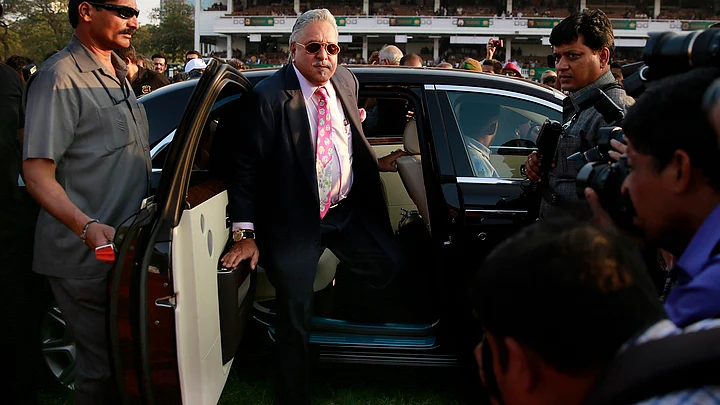Embattled liquor tycoon Vijay Mallya has been allocated 2 July as the date for a brief hearing to convince a High Court judge that he should be given permission to proceed to a full-blown appeal process against his extradition to India to face alleged fraud and money laundering charges amounting to Rs 9,000 crores.
- Mallya remains on bail on an extradition warrant executed by Scotland Yard in April 2017
- UK home secretary Sajid Javid had signed off on a Westminster Magistrates’ Court order for Mallya to be extradited to face the Indian courts back in February
- Vijay Mallya has submitted a “renewal application” against his extradition
- Mallya’s first application was refused
(At The Quint, we question everything. Play an active role in shaping our journalism by becoming a member today.)
Mallya's Extradition: UK High Court to Hear Liquor Tycoon's Plea on 2 July
Embattled liquor tycoon Vijay Mallya has been allocated 2 July as the date for a brief hearing to convince a High Court judge that he should be given permission to proceed to a full-blown appeal process against his extradition to India to face alleged fraud and money laundering charges amounting to Rs 9,000 crores.
The 63-year-old former Kingfisher Airlines boss had filed the "renewal application" earlier this month after he failed in his first written attempt seeking leave to appeal in the High Court. The renewal involves a short oral hearing before a High Court judge, now scheduled for 2 July, where his lawyers will further plead his case against being extradited to India.
On 2 July, Mallya's legal team and the Crown Prosecution Service (CPS) – arguing on behalf of the Indian government – will go head to head to reiterate factors for and against the businessman's extradition to Arthur Road Jail in Mumbai. A High Court judge must now decide following the “oral consideration” if Mallya's appeal can proceed to a full hearing.
It will mark one of the final stages of the appeals process in the UK as the chances of permission to appeal to the Supreme Court are unlikely if permission to appeal is denied at the High Court stage.
Mallya would have the option to approach the European Court of Human Rights (ECHR) based in Strasbourg, France, to argue against his extradition to India on human rights grounds by trying to prove a real threat of harm or torture.
Declaring Me Fugitive Offender Like Giving 'Economic Death Penalty': Mallya
Embattled liquor tycoon Vijay Mallya told the Bombay High Court on Wednesday, 24 April, that by declaring him a fugitive economic offender and allowing attachment of his assets, a special court had awarded him an "economic death penalty".
"My debts and the interest on such debts are mounting. I have assets to pay off these debts but the government won't allow the use of these assets to clear the debts. I have no control over my properties," the businessman said, as per PTI.
Mallya's Lawyer Challenges Validity of Fugitive Economic Offenders Act
Liquor baron Vijay Mallya's lawyer has challenged the constitutional validity of the Fugitive Economic Offenders Act in the Bombay High Court.
His lawyer, Amit Desai, argued in court that “confiscating Mallya's properties under FEOA is like (awarding an) economical death penalty to him”.
UK Court to Hear Mallya's Application Against Extradition
A UK court will hear Vijay Mallya’s extradition case on Friday. UK Home Secretary Sajid Javid had signed off on a Westminster Magistrates' Court order for Mallya to be extradited to face the Indian courts back in February.
Mallya then filed an application for permission to appeal against that decision in the High Court, which was refused by Justice William Davis, giving him a week to apply for “oral consideration” via a renewal application.
